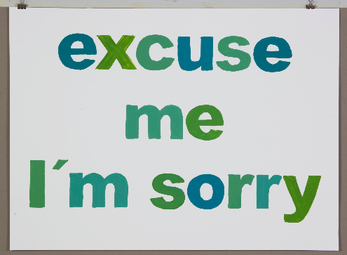
When I'm in Israel, I usually find myself using the word frequently. Someone bumps into me while I'm standing in line for the bus. I say, S'lichah. I need to get the waitress' attention in a restaurant – S'lichah. I apologize for interrupting someone who is speaking too fast for me to understand – S'lichah.
At some point, I realize that, with my American attitudes about etiquette, I am saying "S'lichah" far more often than any Israeli ever would. In Israel's culture of "all for one and one for all," s'lichah can sound a little too polite, too unassertive, and even a bit whiny. It takes us Americans a while to catch on to the idea that when we say "excuse me," to an Israeli, it sounds like we're calling unnecessary attention to our own needs. "You feel like you need to be excused? Who cares?"
But the lack of s'lichah in Israeli culture should not be taken as a sign of a society that does not understand the importance of seeking forgiveness. Far from it. Israelis, as a whole, tend to be very concerned with how their actions affect others. Most Israelis are quicker to say ani mitzta'eir/et, "I am sorry," and ta'iti, "I was wrong," than most Americans are. If you think about it, admitting wrongdoing and expressing remorse are more meaningful expressions than just brushing aside a misstep or an uncomfortable situation with a quick "S'lichah."
This Saturday night, we will prepare for the coming Days of Awe with Selichot. This is an Ashkenazic practice, more than a thousand years old, of rising in the middle of the night during the week before Rosh Hashanah to speak prayers begging God's forgiveness. The congregation I serve, like many others, has a special late-night service on the post-Shabbat Saturday night before Rosh Hashanah to recite prayers, sing High Holy Day songs, read poetry, and engage in reflection that helps provoke us into seeking forgiveness from God for the wrongs we have done. At the darkest time of day, we try to come out of the darkness of shame and guilt and into the light of a new beginning, clean of our past mistakes and faults.
The name, "Selichot," says a lot of what the service is about. The Hebrew word Selichot is a form of "s'lichah." It means "Pardons." Like the Israeli notion of "excuse me," though, Selichot is not about making excuses or indulging in self-focused navel gazing. As much as we contemporary Jews, especially liberal Jews, like to think of the High Holy Days as a time for putting ourselves on the therapist's couch – as much as we think of t'shuvah as an ancient form of psychoanalysis – it really is supposed to be directed outward, not inward.
In his Laws of Repentance, the great Jewish philosopher, Rambam (also known as Maimonides), emphasized that the confessional prayers of the Days of Awe are not directed just to ones own self. He says repeatedly that the confessions must be addressed to God and they must be said out loud. Selichot is not just about the self. It is about seeing ourselves as being part of something greater. Our offenses against other people and against God hurt us – certainly – but our focus should be on how they damage the world and how they damage our relationship with God.
In this sense, I think the approach to s'lichah that we see in Israeli society is closer to the Jewish ideal than the American version. The Selichot service – and, indeed, this entire season of repentance – challenges us to see our faults as being more than failures to "be our best selves." After all, who really cares that you feel like you need to be excused? On Selichot night, we begin to awaken to the idea that our failings have cosmic consequences. It is not just ourselves we damage with our unjustified anger, our petty jealousies, our lax attitude on ethical issues, or by acting on our selfish desires. We hurt the universe. We postpone our goal of repairing the world.
So, as you enter your synagogue on Saturday night, take a moment to say a bit more to God than just, "Excuse me," or, "I beg your pardon." Be prepared to dig deeply into yourself to acknowledge that your intemperate, ill-chosen, wrongful and hurtful actions have had a negative impact on all the world around you. Let that awareness deepen your resolve to change, not just for your own sake, but for all of creation.
Other Posts on This Topic:
For the Sin We Have Sinned Against You...
You are What You Choose to Be

 RSS Feed
RSS Feed
